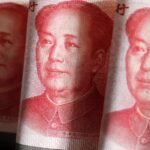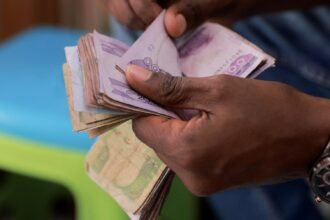Governor of the Bank of Ghana (BoG), Dr Johnson Asiama, says Ghana’s foreign exchange market has regained its stability, with commercial banks now driving trade rather than the central bank.
Speaking in an interview with the IMF during the ongoing IMF/World Bank Spring Meetings in Washington DC on October 16, he said recent interventions by the Bank of Ghana were temporary measures to cushion the market during a period of heavy outflows and lumpy payments.
“Yes, there were allegations about whether we were intervening in the market,” he said. “But that was not exactly the case.”
He explained that between the second and third quarters, the central bank had to meet large financial obligations, including billions of dollars in arrears owed to Independent Power Producers (IPPs).
The period also saw some domestic debt exchange bondholders deciding to exit their investments following the appreciation of the cedi.
“There were all these large arrears in payments to some of the IPPs,” he said.
“And we also had some of the domestic debt-affected bondholders that wanted to exit. Because the currency had appreciated, they felt it was the right time to take up their investment. We had to allow them to go.”
Dr Asiama said the Bank of Ghana was compelled to make significant payments between July and August to settle those obligations, leading to perceptions that it was heavily intervening in the FX market.
“All these inflows accrue to the central bank, and it was happening at the time when we saw some decline in remittance inflows,” he explained.
“Remittance inflows are another huge source of FX injection — over six billion US dollars per year. However, immediately after the currency appreciated, we saw a decline.”
He said the combination of reduced remittance inflows and large outflows caused a temporary strain on the interbank market.
“During that time, the interbank FX market had dried up, and so the central bank needed to provide that support,” he said.
Dr Asiama, however, expressed confidence that the market had since recovered. “I’m happy to say that the interbank FX market has come back,” he said.
He disclosed that the Bank of Ghana had instructed mining companies to channel all foreign exchange inflows through commercial banks.
“We have written to the mining firms, for example, to take all their inflows through the commercial banks,” he stated. “So we are beginning to see some pickup in interbank FX market activity.”
He clarified that gold inflows remain an exception but noted that the trend points to a more vibrant, self-sustaining FX market.
“What we have now is to intermediate what comes from the Gold Board, and then the rest is taken into our reserves,” he said.
Dr. Asiama gave specific figures to show that demand on the market had normalised.
“As of yesterday, we had committed to make available 150 million US dollars,” he said.
“This morning, when I checked, the market had picked up only 90 million dollars, so 60 million automatically goes into our reserves. Same thing Tuesday — we made available 150 million dollars, and the market picked up less than half that.”
He stressed that the Bank of Ghana is not over-supporting the market. “We do not over-support the markets at all,” he said.
“All we seek to do is to limit the volatilities in the markets, to ensure that we have that smooth dynamics in the market, and that’s the framework we will maintain going forward.”
DISCLAIMER: The Views, Comments, Opinions, Contributions and Statements made by Readers and Contributors on this platform do not necessarily represent the views or policy of Multimedia Group Limited.
DISCLAIMER: The Views, Comments, Opinions, Contributions and Statements made by Readers and Contributors on this platform do not necessarily represent the views or policy of Multimedia Group Limited.
Source link




















